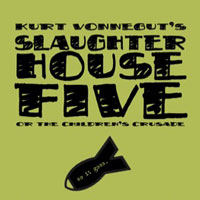So It Went
Last night I frequented a local theater production of Slaughterhouse Five featuring the surprisingly versatile Lily Vonnegut.
I’m don’t fancy myself as much of a theater reviewer, but the performance deeply affected me, as I relived some of the more poignant moments of such a formative work. Suffice to say that both A.J. Diamond and Don Sclossman effortlessly captured the perplexed, unstuck in time, Billy Pilgrim. Schlossman, who is a dead ringer for the love child of Darrell Hammond and Glenn Beck, is clearly destined to take the roll of Beck in a future Christopher Guest mockumentary.
This was not an easy piece to take to stage, given the non-linear plot line, forcing the players to quickly shift between a 60s barbershop quartet and German soldiers torturing a group of POWs. Every actor had two to three parts to play at minimum. It was especially pleasing to watch Gretchen Koerner prattle on about an engagement gift as Valencia, and subsequently return to the stage as a barking, German staff sergeant. Even the Tralfamadorians (Vonnegut’s plunger-shaped aliens) were given a surprising amount of depth.
It had been several years since I had read though the book, and in the reproduction, I was struck at how keen and incredibly relevant is Vonnegut’s critique of American hegemony.
“America is the wealthiest nation on Earth, but its people are mainly poor, and poor Americans are urged to hate themselves…. It is in fact a crime for an American to be poor, even though America is a nation of poor. Every other nation has folk traditions of men who were poor but extremely wise and virtuous, and therefore more estimable than anyone with power and gold. No such tales are told by American poor. They mock themselves and glorify their betters.”
For all the now en vogue criticisms of banking cartels and financial terrorists, Vonnegut had our society’s fate absolutely pegged 40 years ago. He recognized that despite the shifts in party politics, and despite pop-culture and counter-culture movements, America has been on an unwavering march towards an Oligarchic State. The seeds were planted during the Industrial Revolution, and we have not veered from that path since.
I was especially pleased to see those critical philosophical excerpts featured in the theater piece. It seemed, at times, that the chic Los Angeles audience attending had absolutely no idea what to do with Vonnegut’s prescient progressive soliloquies. All the more reason that they were necessary to include. This culture needs a heaping dose of Vonnegut horse-sense, more than ever.
On a personal note, it meant a great deal to have met Lily, who found the Meppers via our Vonnegut video. I only wish that Storey could have been there, as well. The evening was a welcome reminder that your work can affect people that you least expect, if you’re willing to give of your inner self.




